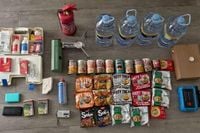On April 28, 2025, a massive blackout paralyzed the Community of Madrid and much of Spain, leaving millions without electricity, communications, and transportation. The sudden loss of 60% of the country's energy in just five seconds created chaos, prompting citizens to scramble for supplies, reminiscent of the panic buying seen during the early days of the pandemic.
At precisely 12:33 PM, 15 gigawatts of generation were lost, triggering a total blackout that caught many unprepared. Local businesses, particularly neighborhood stores and Chinese bazaars, quickly became the epicenter of activity as residents sought essential items. "First, we ran out of batteries, then radios, flashlights, lighters, and even gas stoves," recounted a shopkeeper at Hiper Asia on Paseo de la Castellana.
As the blackout continued, many workers in the city sought refuge in bars and cafes, hoping the outage would be temporary. However, with telecommunications services also failing, businesses were forced to send employees home. Supermarkets, pharmacies, and banks quickly followed suit, unable to operate without electricity.
Mercadona, one of Spain's largest supermarket chains, managed to keep its doors open thanks to backup generators, selling out of water, milk, and bread as customers rushed to stock up. Isabel, a 61-year-old shopper, noted, "It was like during COVID. People filled their carts with essentials, and there wasn't a wedge of cheese left on the shelves." In contrast, Lidl in Tetuán had to discard all its frozen food due to safety concerns.
As the day progressed, the atmosphere became increasingly tense. Some stores had to close, while others, like Mercadona, operated normally. The lack of electricity and functioning cash registers forced many small businesses to shut down. Essential services, including pharmacies, were unable to dispense medications, while banks closed their doors for security reasons once ATMs became inoperable.
The blackout evoked memories of the pandemic, with citizens joking about the European Union's survival kit recommendations. Many had not heeded these guidelines until faced with the reality of the outage. The EU had proposed a survival kit in January 2025, advising households to prepare for emergencies with essentials like water, non-perishable food, flashlights, and batteries.
In the midst of the chaos, some individuals had prepared ahead of time. Miguel Morales, who began stocking up after the COVID pandemic, shared his insights: "The difference between a critical situation and a vacation at home is how prepared you are." He emphasized the importance of having non-perishable foods and batteries on hand, having included long-lasting products in his shopping over the past six months.
Similarly, Isra Fernández, inspired by past events like the September 11 attacks and the film '28 Days Later', created his own survival kit. He highlighted the necessity of having a crank radio, which he described as an essential tool for staying informed during the blackout. "When the coverage fell, the radio became crucial for updates," he said.
As the sun set on April 28, the situation began to stabilize. President Pedro Sánchez addressed the nation, stating, "What happened yesterday cannot happen again." He acknowledged the need for a thorough review of Spain's electrical grid to prevent future occurrences. As services gradually resumed, many citizens expressed relief, but the incident served as a stark reminder of the fragility of modern infrastructure.
As people returned to their routines, the lessons learned from the blackout lingered. The importance of preparedness was underscored, with many citizens now considering the contents of their own survival kits. The experience highlighted not only the vulnerabilities of the electrical grid but also the resilience of communities coming together in times of crisis.
In the aftermath, some individuals took to social media to share their experiences and preparations for future emergencies. Others emphasized the need for calm and responsible consumption, urging against unnecessary stockpiling and panic buying.
While the blackout was a challenging event for many, it also fostered a sense of solidarity among neighbors and communities. People helped each other navigate the situation, whether by sharing supplies or simply offering support during an uncertain time.
As Spain moves forward from this incident, the call for greater awareness and preparation resonates strongly. The blackout may have been a moment of crisis, but it also served as a catalyst for change in how individuals and communities approach emergency preparedness.
In conclusion, the events of April 28, 2025, will be remembered not just for the chaos they caused, but for the lessons they imparted about the need for readiness in an increasingly unpredictable world.



